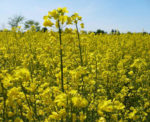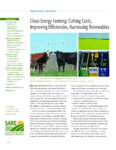The educational materials listed on this page are about Bioenergy and Biofuels.
A biofuel is produced through biological processes, such as agriculture and anaerobic digestion, rather than a fuel produced by geological processes, such as coal and petroleum, from prehistoric biological matter. Biomass, unlike other renewable energy, can be converted into liquid biofuels to help meet transportation fuel needs. You may have heard this type of fuel referred to as biogas or bioenergy. The two most common types of biofuels in use today are ethanol, sometimes called e85 gas, and biodiesel. Ethanol fuel, or e85 fuel, is a product of agriculture and comes from corn. Biomass energy can also be derived indirectly from agricultural, commercial, domestic, or industrial wastes to create biomass fuel. Key practices include agronomic crops as byproduct utilization, bioenergy and biofuels, anaerobic digestion, biodiesel, biofuel feedstocks, nutrient cycling, municipal wastes, renewable energy.
The SARE bulletin Clean Energy Farming: Cutting Costs, Improving Efficiencies, Harnessing Renewables shows farmers ways to utilize clean energy practices on their operations, whether large or small. This will help farmers learn ways to implement farming practices that both save energy and protect natural resources, and produce and use renewable fuels. SARE’s book, Building a Sustainable Business, guides producers who want to build a sustainable and profitable business plan to include renewable energy and biofuel options. The Farm Energy Topic Room provides a wealth of information on clean energy topics, including biodiesel, farm energy audits, solar and wind energy, and more.
Showing 1-10 of 11 results
Northeast Farm Energy IQ
Farm Energy IQ offers free information to help farmers enhance operational sustainability in the context of the farm economy and ecosystem.

Sustainable Production and Use of On-Farm Energy
Using solar or wind energy or producing biofuels from crop feedstocks and anaerobic digestion helps farmers achieve energy independence while improving profitability and reducing fossil fuel emissions.

The Sustainability of Biofuel Fact Sheet Series
This 18-part series addresses topics related to the sustainability of biofuel production, including biodiversity, greenhouse gas reductions, life cycle analysis and more.

Energy Independence: On-Farm Biodiesel Fuel Production
Roger Rainville is ahead of the curve when it comes to reducing costs on his farm near Alburgh, Vt. He’s currently producing biodiesel from canola and sunflower for about $1.70 a gallon.

Growing Biodiesel Crops: A Couple of Tips
In this short video, Rainville describes his philosophy for trying something new on your farm. It’s all about making the most of the learning curve.
Storage Methods for Ethanol Co-Products
This University of Nebraska video series contains information on the storage and utilization of three unique co-product feeds from the ethanol industry.
Greenhouse Energy Conservation Strategies and Alternative Fuels
Includes curriculum materials, extension bulletins, resource lists, and a greenhouse energy model that were developed with the intention that educators can use the materials in full or part to deliver programming on energy management and conservation for greenhouse production.

Small-Scale Biogas Technology
This website has information on technology for turning organic waste into biogas for small-scale, on-farm energy applications.

Clean Energy Farming
Clean Energy Farming: Cutting Costs, Improving Efficiencies, Harnessing Renewables features innovative SARE-funded research and examples of farmers who are improving energy efficiency while saving money, implementing farming practices that both save energy and protect natural resources, and producing and using renewable fuels.

Biodiesel Safety and Best Management Practices for Small-Scale Noncommercial Use and Production
This publication reviews some of the accepted practices associated with small-scale biodiesel production to make it a safe, environmentally sound practice that generates a quality product.